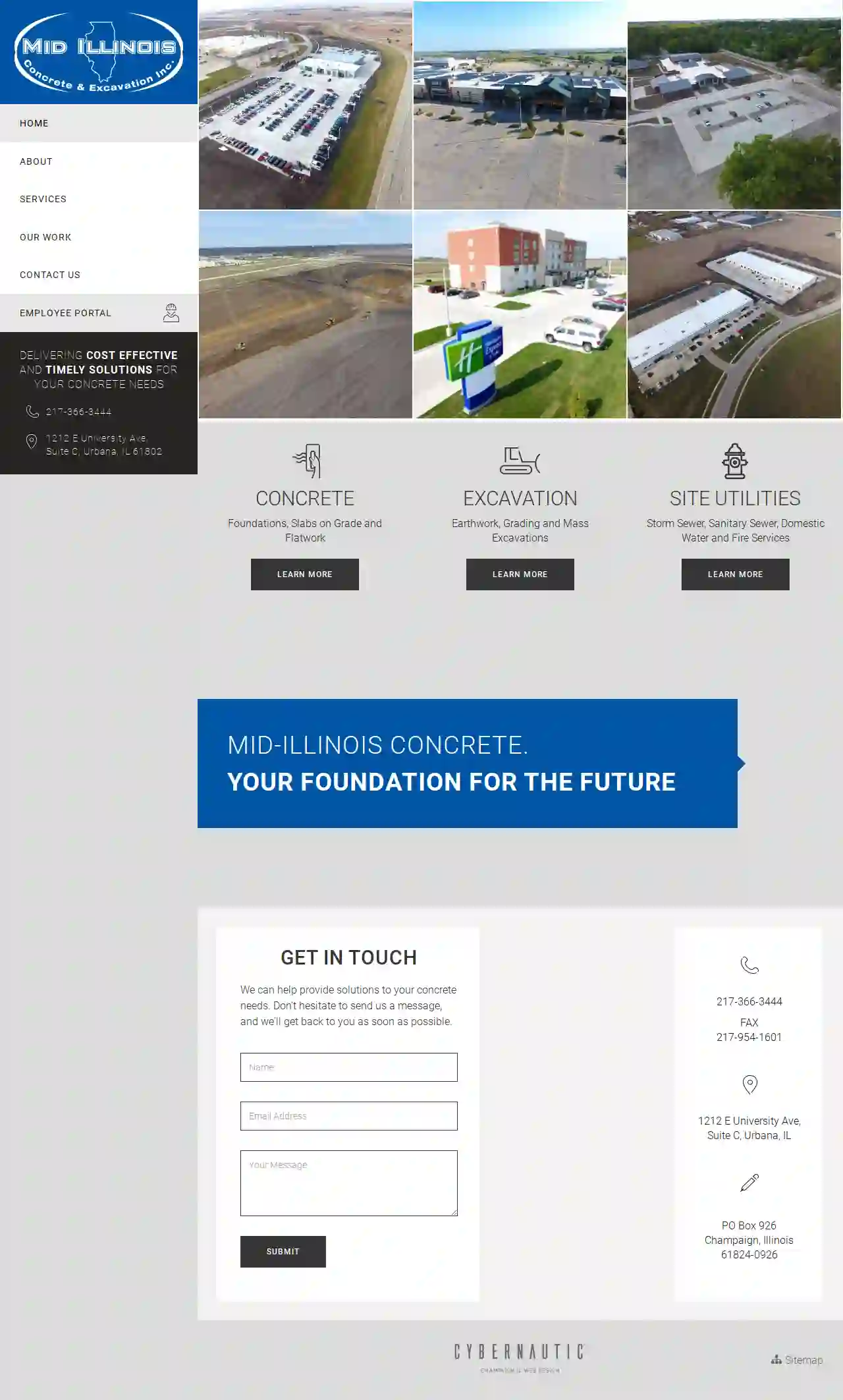Excavation Contractors Erie
Best Excavation Company Near Me in Erie
Get multiple Excavation Contractors Near Me quotes for your project today! Compare profiles, reviews, accreditations, portfolio, etc... and choose the best service.

Mid Illinois Concrete & Excavation
54 reviews1212 E University Ave, Suite C, Urbana, IL, 61802, USMid-Illinois Concrete is your foundation for the future. We are a full-service excavation, utility, and concrete contractor serving the Champaign-Urbana area. We are committed to providing our clients with cost-effective and timely solutions for all their concrete needs. Our team of experienced professionals is dedicated to delivering high-quality workmanship and exceptional customer service. We have a proven track record of success in a wide range of projects, including: Foundations Slabs on grade Flatwork Earthwork Grading Mass excavations Storm sewer Sanitary sewer Domestic water Fire services We are committed to safety and quality, and we are proud to be a member of the following organizations: Illinois Concrete Association National Ready Mixed Concrete Association Contact us today to learn more about how we can help you with your next project.
- Services
- Why Us?
- Gallery
Get Quote
Ohio Erie Excavating
1Erie, USWe are excited to announce that ohioerie.com is almost ready to launch! Get started by uploading your website. Need help? Visit our Admin Panel or contact DreamHost for support.
- Services
- Why Us?
Get Quote
Erie Excavating & Liquid Waste
53 reviewsErie, US- Services
- Why Us?
Get Quote
Over 3,943+ Excavation Companies on our directory
Our excavation companies operate in Erie & surroundings!
ExcavationHQ has curated and vetted Top Excavation Contractors arround Erie. Find a top & reliable pro today.
Frequently Asked Questions About Excavation Contractors
- Basement Size: The larger the basement, the more excavation is required, increasing the cost.
- Soil Type: Excavating rocky or dense clay soil is generally more expensive than loose soil.
- Accessibility: Difficult-to-access sites might require specialized equipment or more labor, driving up costs.
- Foundation Type: The chosen foundation type (full basement, crawl space, slab) affects excavation needs.
- Underpinning: If underpinning (strengthening existing foundations) is necessary, it significantly increases costs.
- Disposal Fees: Hauling excavated soil to disposal sites adds to the overall expense.
- Project Size and Scope: Larger, more complex excavations naturally take longer.
- Soil Conditions: Rocky or challenging soil types can slow down progress.
- Site Accessibility: Limited access might require more time for maneuvering equipment and hauling materials.
- Weather: Inclement weather can cause delays.
- Permitting and Inspections: Waiting for permits or inspections can extend the timeline.
- Experience: Choose contractors with a proven track record and years of experience in excavation projects similar to yours.
- Licensing and Insurance: Verify that they are properly licensed to operate in your area and carry adequate insurance to protect you from liability in case of accidents or damage.
- Equipment and Resources: Ensure they have the necessary equipment and resources to handle your project efficiently and safely.
- Positive Reviews and References: Check online reviews and testimonials from previous customers. Request references and contact them to inquire about their experience with the contractor.
- Professionalism: Opt for a company that communicates clearly, provides detailed and transparent estimates, and has a responsive and courteous team.
How much does it cost to excavate a basement?
How long does an excavation project take?
How do I find a good excavation contractor?
What is the difference between excavation and grading?
Excavation: Primarily involves removing earth or other materials from a site. It's about digging down and creating space.
Grading: Focuses on shaping and leveling the ground to a specific slope or elevation. It's about adjusting the existing terrain.
For example, you might excavate a foundation and then grade the surrounding area to ensure proper drainage and a level surface for landscaping.
How much does it cost to excavate a basement?
- Basement Size: The larger the basement, the more excavation is required, increasing the cost.
- Soil Type: Excavating rocky or dense clay soil is generally more expensive than loose soil.
- Accessibility: Difficult-to-access sites might require specialized equipment or more labor, driving up costs.
- Foundation Type: The chosen foundation type (full basement, crawl space, slab) affects excavation needs.
- Underpinning: If underpinning (strengthening existing foundations) is necessary, it significantly increases costs.
- Disposal Fees: Hauling excavated soil to disposal sites adds to the overall expense.
How long does an excavation project take?
- Project Size and Scope: Larger, more complex excavations naturally take longer.
- Soil Conditions: Rocky or challenging soil types can slow down progress.
- Site Accessibility: Limited access might require more time for maneuvering equipment and hauling materials.
- Weather: Inclement weather can cause delays.
- Permitting and Inspections: Waiting for permits or inspections can extend the timeline.
How do I find a good excavation contractor?
- Experience: Choose contractors with a proven track record and years of experience in excavation projects similar to yours.
- Licensing and Insurance: Verify that they are properly licensed to operate in your area and carry adequate insurance to protect you from liability in case of accidents or damage.
- Equipment and Resources: Ensure they have the necessary equipment and resources to handle your project efficiently and safely.
- Positive Reviews and References: Check online reviews and testimonials from previous customers. Request references and contact them to inquire about their experience with the contractor.
- Professionalism: Opt for a company that communicates clearly, provides detailed and transparent estimates, and has a responsive and courteous team.
What is the difference between excavation and grading?
Excavation: Primarily involves removing earth or other materials from a site. It's about digging down and creating space.
Grading: Focuses on shaping and leveling the ground to a specific slope or elevation. It's about adjusting the existing terrain.
For example, you might excavate a foundation and then grade the surrounding area to ensure proper drainage and a level surface for landscaping.